The nursing profession has many rewarding roles, even some high-level positions. However, most high-level roles in the nursing field require a Master’s in Nursing as a basic qualification. So, if you want to take your career to new heights, you’ll most likely need to enroll in a graduate degree in nursing. With so many nursing master’s degrees available to choose from, it’s overwhelming to decide on the best one.
This guide covers everything you need to know about a master’s degree in nursing (MSN), from the different types of MSN programs, where to study, job prospects, salaries, and more.
What’s the Difference Between an MSN and a BSN?
A BSN, or bachelor’s degree in nursing, usually involves four years of study. You don’t need professional or educational experience in nursing to achieve admission to a BSN program.
On the other hand, an MSN or Master’s of Nursing usually requires 18-24 months of study and typically has a BSN as a prerequisite. And, some master’s of nursing programs require some practical experience in the nursing field.
A BSN can qualify you to work as a nurse, a nurse health coach, or a nurse recruiter. However, for higher-level positions like a nursing manager, APRN (Advanced Practice Registered Nurse), informatics nurse specialist, or clinical nurse leader, you will need to have an MSN.
A Master’s in Nursing will not only help you pursue a more advanced role but will also open up more opportunities for higher salaries.
Related note: We also discussed BSN vs RN.
Master’s Degree in Nursing Specialization
As a nursing professional, you can choose between many available nursing master’s degree specializations. The right specialization should be in line with your passions and dream career aspirations.
Here are the major specializations available in many MSN programs:
- Public Health Nursing
- Administrator Nursing
- Nursing Educator
- Nursing Researcher
- Nursing Informatics
If you aspire to become an APRN or want a more advanced role in clinical nursing, you may have to complete an additional certification. The most common specializations available in Master’s in Nursing for APRNs are:
- Nurse Practitioner (NP)
- Clinical Nurse Specialist (CNS)
- Certified Nurse Midwife (CNM)
- Clinical Nurse Leader (CNL)
- Certified Registered Nurse Anesthetist (CRNA)
Who can Apply for a Master’s in Nursing?
Depending on your current role or where you are in your career, there are a few different paths you can take to get your nursing master’s degree.
BSN-to-MSN
If you are already a registered nurse and possess a bachelor’s degree in nursing, the BSN-to-MSN path is a great option. With a BSN qualification, you can apply for an MSN program straight away. Here’s a nice bonus — with this path, you can continue working as a nurse while you pursue your master’s.
RN-to-MSN Bridge Program
This bridge program is designed for those who have an Associate Degree in Nursing. The RN-to-MSN path allows you to earn your BSN and MSN degrees at the same time.
Direct Entry Program
Can you get a master’s in nursing if you only have a bachelor’s degree in a field other than nursing? Yes, you can! If you want to transition to a nursing career, your best bet is to go through a Direct Entry Program. These programs are for graduates in other fields who aspire to become an APRN or high-level nursing professional.
Dual Master’s Program
The Dual Master of Nursing program helps a nursing professional acquire an additional, leadership-oriented master’s degree alongside their MSN, such as an MBA, MHA (Masters in Healthcare Administration), or MPH (Masters in Public Health). Having two graduate degrees is valuable, and allows you to pursue roles at the highest levels, such as Chief Nursing Officer or CEO in the health sector.

Nursing Master’s Degree Career Paths
A master’s in nursing will make you eligible for many clinical and non-clinical roles in the healthcare sector and beyond. We’ve listed the most common roles you can pursue with an MSN, along with typical salaries for each position. Keep in mind that salaries can vary from state to state.
Certified Registered Nurse Anesthetist (CRNA) – $189K
A CRNA assists with anesthesia procedures by managing medication control before the patient is anesthetized and during the procedure. CRNAs also take care of post-anesthesia recovery. Working in surgical and related areas, CRNAs make an average of $189K.
Certified Nurse Midwife (CNM) – $115K
A certified nurse midwife is responsible for labor and delivery procedures, as well as pre- and post-natal services. These professionals also specialize in women’s health and can work in public and private hospitals, or birth centers. As a CNM, you can earn a salary of approximately $115K.
Nurse Practitioner (NP) – $114K
A nurse practitioner helps provide advanced healthcare to different populations. They independently assess, diagnose, and deliver treatment and care to patients. The national average annual salary of a nurse practitioner is $114K.
Nursing Researcher – $95K
A nursing researcher focuses on the academic or research side of nursing. They conduct in-depth studies in the field, analyze current sector challenges, and recommend policy changes. A nursing research professional in the USA earns an average salary of $95K.
Clinical Nurse Specialist (CNS) – $92K
A clinical nurse specialist is a nursing professional that specializes in a particular area of care, such as gerontology, pediatrics, or diabetes management. The average annual salary of a clinical nurse specialist is around $92K.
Nurse Administrator/Executive – $89K
Nurse administrators and nurse executives are both leadership roles in the nursing sector. They may manage large teams of nurses, or act as a unit manager. On average, a nursing administrator can expect an annual salary of $89K.
Clinical Nurse Leader (CNL) – $83K
Besides delivering care, a clinical nurse leader also supervises a team. For this role, you’ll need a CNL certification from the American Association of Colleges of Nursing in addition to your MSN. The average salary for a clinical nurse leader is $83K.
Informatics Nurse – $79K
An informatics nurse acts as a bridge between nurses and technology. They provide advice on technological innovations in nursing, build databases, conduct data analysis, and develop computer programs. The average salary of an Informatics Nurse is $79K.
Nurse Educator – $78K
A nurse educator’s primary responsibility is to educate the new generation nurses in both the classroom and in clinical settings. This might entail conducting research, presenting findings at conferences, and publishing papers. These professionals have an average salary of $78K.
Public Health Nurse – $63K
A public health nurse is involved in the health status of society in general. They may work at the state or local level in policy, epidemic management, disease prevention, or other related areas. The average base salary of a Public Health Nurse is around $63K.
Master’s Degree in Nursing Requirements
A BSN degree is a basic requirement for an MSN program. However, there are alternative routes as outlined above, as well as additional requirements.
Here are common requirements for Master of Nursing programs:
- Application Form and Fees
- General Statistics or Introductory Statistics Certificate with at least a C grade
- Post-secondary Academic Transcripts
- Professional Letters of Recommendation
- Personal Statement
- Academic Resume
- GRE score
- RN (Registered Nurse) License
- TOEFL or IELTS score (for international students)
Of course, every university and program has individual, specific requirements, so you may not need to satisfy all of the above. Alternatively, there may be additional requirements you need to consider, so it’s important to check the specific prerequisites for the programs you’re considering.
How Much Does a Masters Degree in Nursing Cost?
Most MSN programs are between 18 to 24 months long and the cost can vary from institution to institution. State universities typically have lower tuition and fees than private schools.
Generally speaking, a Master’s in Nursing can cost anywhere from $35,000 to $70,000, or more for the most expensive institutions. Costs are usually calculated per credit hour, and so the total cost will depend upon the total number of credits you take.
The Best MSN Programs
University of Pennsylvania (Master of Science in Nursing (MSN))
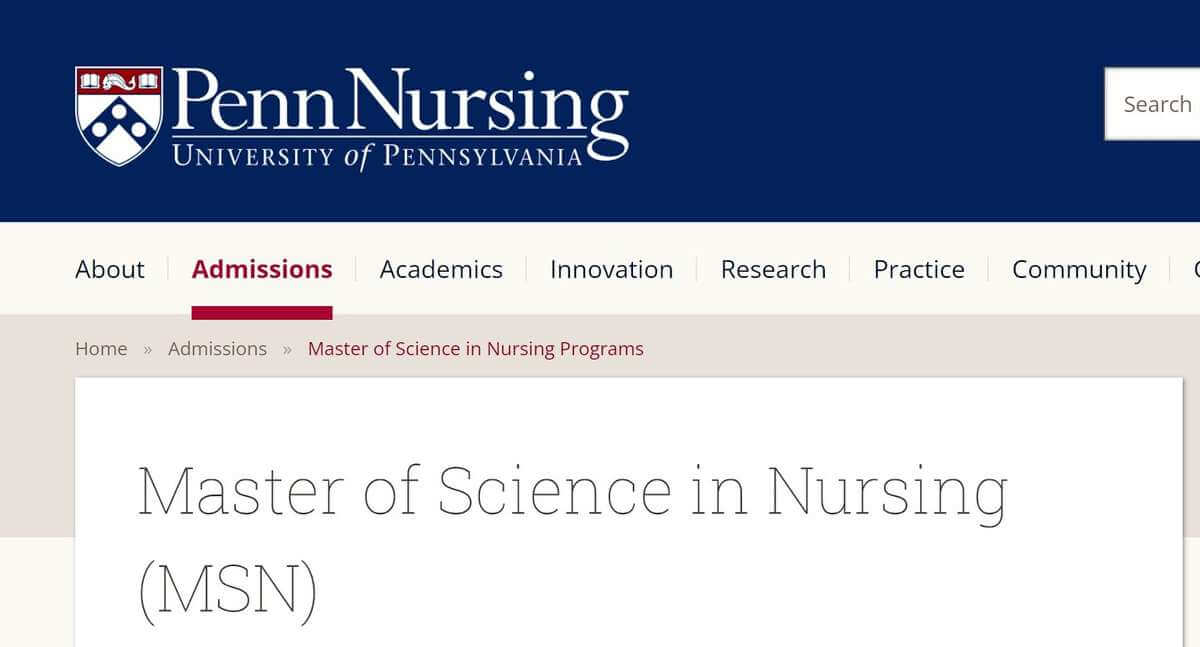
Tuition: approximately $45K per year
The MSN program at the University of Pennsylvania is one of the best in the country. The program offers a wide range of concentrations, including Adult-Gerontology, Pediatrics, and Women’s Health.
Columbia University School of Nursing (Masters in Advanced Clinical Management and Leadership)
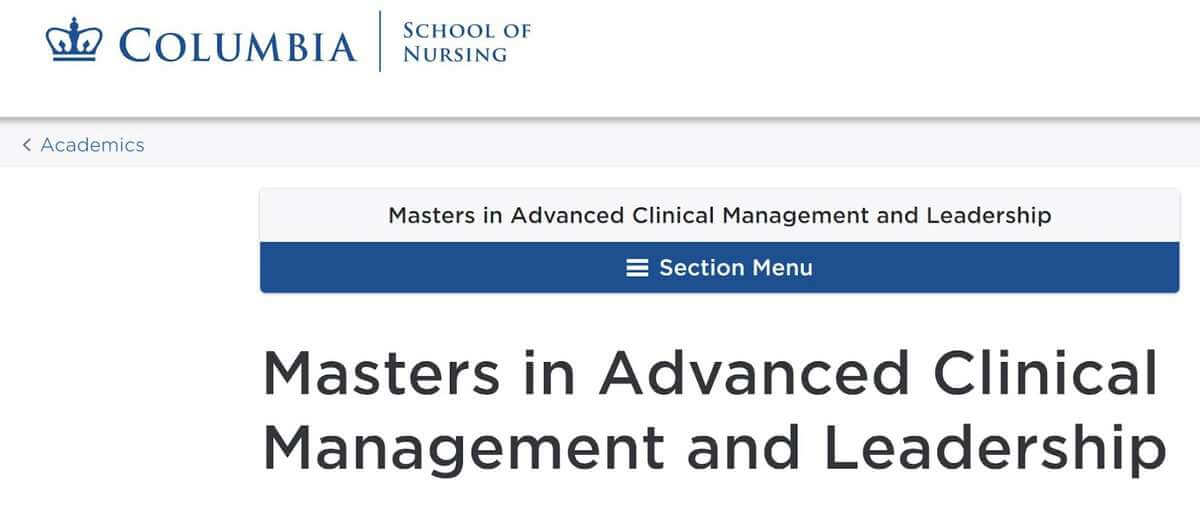
Tuition: $87K per year
This is a five-semester program designed to create the nursing leaders of tomorrow. The program can be completed with 30 credits and focuses on quality improvement and technological innovation.
Johns Hopkins University (Master of Science in Nursing (MSN))
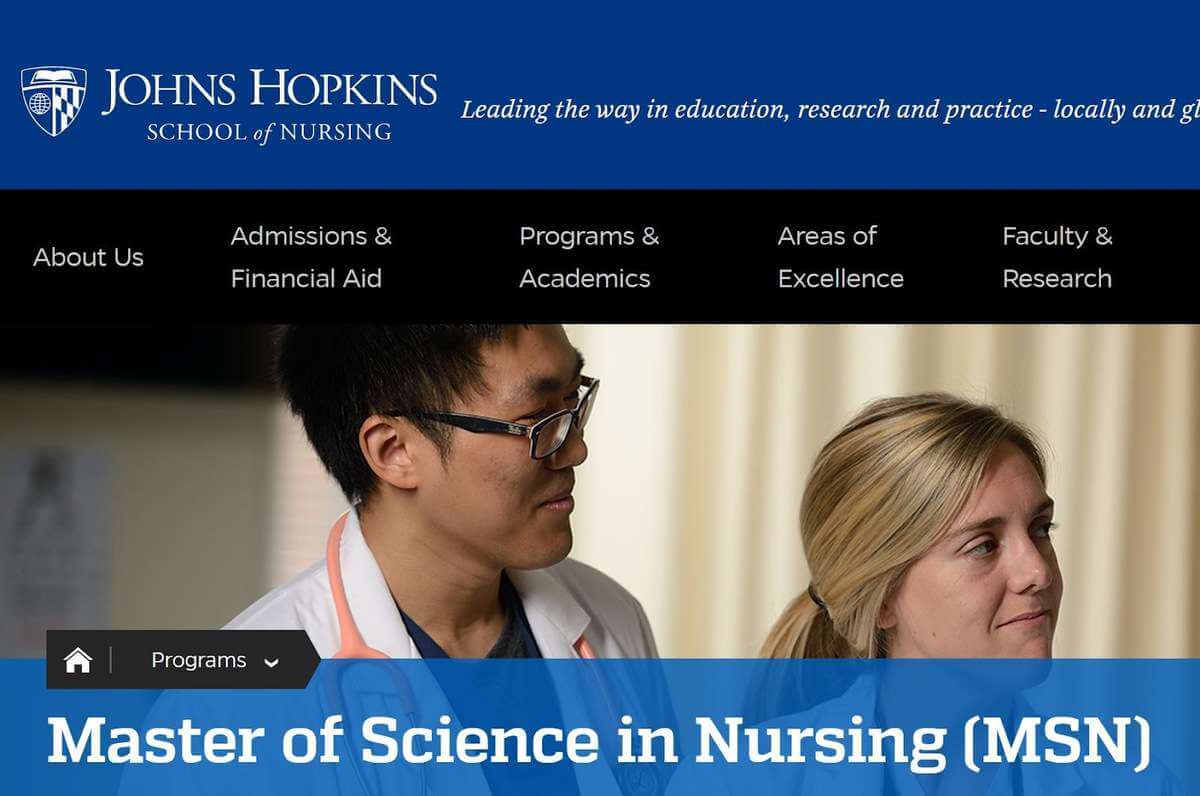
Tuition: $65,088 per year (MSN Entry into Nursing) and $52,342 per year (MSN in Healthcare Organizational Leadership)
Johns Hopkins University provides two nursing master’s degrees. The MSN Entry into Nursing Program is suitable for those with a non-nursing bachelor’s degree. This program aims to create nursing professionals with specialized knowledge in the field of global health.
On the other hand, the MSN in Healthcare Organizational Leadership is designed to mold professionals into leaders. Graduates can become experts in fiscal and strategic management, and learn how to solve ethical and legal issues.
The University of North Carolina at Chapel Hill (MSN Nurse Practitioner)
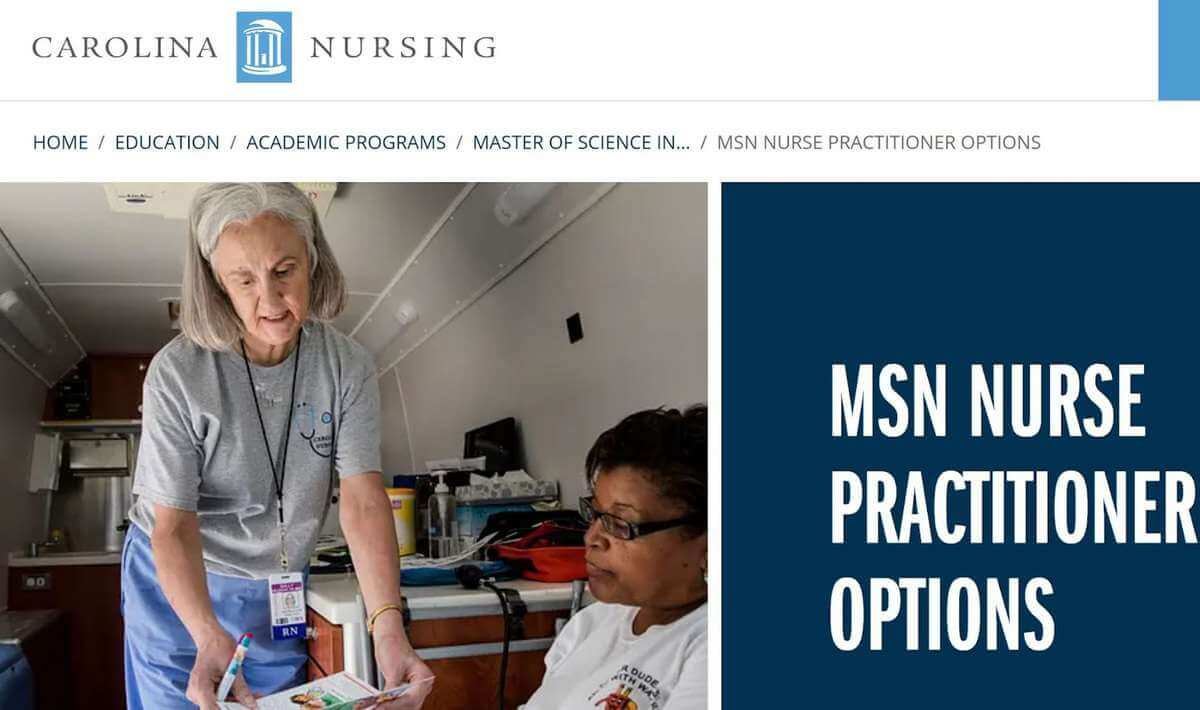
Tuition: $19,062 per year
This hybrid program focuses on concentrations such as Adult-Gerontology, Family Health, and Mental Health. Even better, the University of North Carolina is a public school that offers very affordable rates of tuition.
University of Washington (Master of Nursing)
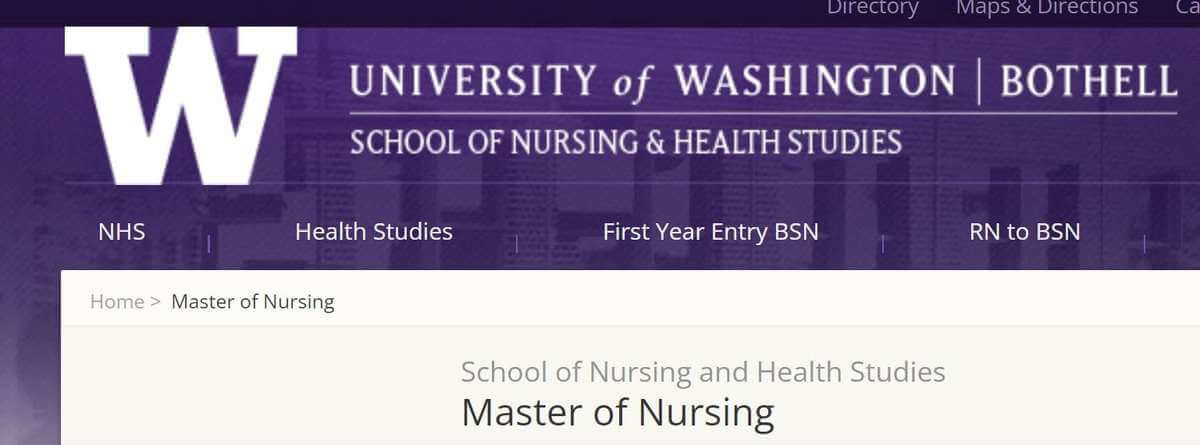
Tuition: $17,919 per year.
Another affordable option is the University of Washington’s Master in Nursing. This program has three tracks: Nurse Leadership, Nursing Education, and a general track. All tracks offer full-time and part-time options to prepare graduates for leadership and advanced nursing roles.
Key Takeaways
A Master’s in Nursing will build your skills and knowledge in the field, equipping you for leadership positions and advanced roles in the health sector. Many schools across the country offer MSN programs that cover a range of specializations. This makes it easy to find a program to match your interests and career goals.
You don’t need professional experience in the field or even a nursing bachelor’s degree to apply for a master’s degree in nursing. There are a few different paths to get into your preferred MSN program, and pursue your dream career in nursing!
Ready to put in your application? Check out our complete guide to applying to grad school.
Lisa is a full-time writer specializing in career advice, further education, and personal development. She works from all over the world, and when not writing you'll find her hiking, practicing yoga, or enjoying a glass of Malbec.











